Switch to the mobile version of this page.
Vermont's Independent Voice
- News
- Arts+Culture
- Home+Design
- Food
- Cannabis
- Music
- On Screen
- Events
- Jobs
- Obituaries
- Classifieds
- Personals
Browse News
Departments
Browse Arts + Culture
View All
local resources
Browse Food + Drink
View All
Browse Cannabis
View All
-
Culture

'Cannasations' Podcaster Kris Brown Aims to 'Humanize'…
-
True 802

A Burlington Cannabis Shop Plans to Host…
-
Business

Judge Tosses Burlington Cannabiz Owner's Lawsuit
-
Health + Fitness

Vermont's Cannabis Nurse Hotline Answers Health Questions…
-
Business

Waterbury Couple Buy Rare Vermont Cannabis License
Browse Music
View All
Browse On Screen
Browse Events
Browse Classifieds
Browse Personals
-

If you're looking for "I Spys," dating or LTRs, this is your scene.
View Profiles
Special Reports
Pubs+More
Local Commotion: National Divisions on Race and Equity Are Roiling Vermont School Boards
Published February 16, 2022 at 10:00 a.m. | Updated May 31, 2022 at 7:44 p.m.
The December 14 Rutland City School Board meeting agenda was packed. The 11 school board members needed to ratify a budget for the tech center, discuss a budget for fiscal year 2023 and recognize middle schoolers for their achievements in writing. More than 75 teachers and support staff, clad in red T-shirts to show solidarity, had packed the room and hall outside to raise concerns about an impasse in contract negotiations.
But before the board could take any action, the meeting was derailed by a hotter topic — the school mascot. Members had ditched the Raiders name in 2020 after a group of students and alumni successfully argued that the mascot perpetuated racist Native American stereotypes. But on Town Meeting Day 2021, voters elected three school board members who rejected that argument; they promptly began pushing to reinstate the old name.
Now, when one board member questioned why "Rutland Moniker" was on the agenda under unfinished business, the disagreement boiled over into a sloppy stew of gavel-banging, finger-pointing and profanity.
"Five-minute recess. Period!" board chair Hurley Cavacas yelled after commissioner Alison Notte questioned his decision to consult privately with his personal lawyer.
"Alison, you're a bitch," board member Brittany Cavacas, Hurley's daughter, told Notte.
Notte whirled around to face the elder Cavacas, who was trying to talk to her: "Leave me alone and do not speak to me until we're in session."
Post-recess, after the board failed to agree on an amended agenda, Cavacas adjourned the meeting — all of its business undone.
"It was incredibly disappointing," said sixth-grade teacher Sue Tanen, who had been hoping to speak on behalf of educators that night.
Community members had also watched in disbelief. Bob Pearo, a local business owner and father, said witnessing the "complete fiasco" spurred him to run for school board this March.
"There was literally no control," Pearo said. "If people's tempers had flared, they should have been asked to leave the meeting until they could get themselves in check."
click to enlarge 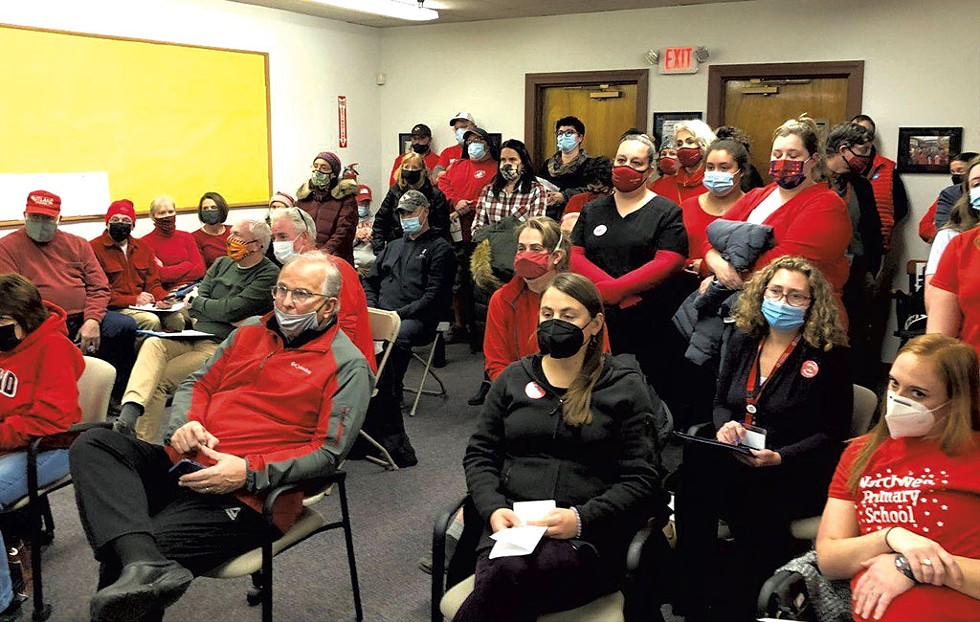

- Courtesy Of Jim Sabataso/Rutland Herald
- Rutland School Board meeting on December 14, 2021
While the "Jerry Springer"-esque display of dysfunction in Rutland may have been particularly embarrassing, it's just one of a number of conflicts that have played out at school board meetings in half a dozen Vermont school districts over the last year.
Ignited by president Donald Trump-era divisions and fueled by the renewed movement for racial justice, once sedate meetings have turned into battlegrounds over polarizing topics such as critical race theory and the Black Lives Matter flag. The local fights have created rifts among board members, spurred residents to air their grievances over school policies and, in some communities, added a political charge to next month's school board races.
In Rutland, for instance, the pro-Raiders contingent succeeded in reinstating the controversial name last month. But now 10 candidates — including several in favor of the Raiders mascot and several against — are running for four seats on the school board. And in Springfield, Essex, St. Albans, Shrewsbury and Barton, the March ballot will include candidates energized by the debate over how schools should handle polarizing issues such as equity and race.
The issues driving school board drama in Vermont are a reflection of the way that, across the country, schools have become an arena in the larger political battle between conservative and liberal forces. Steve Bannon, once chief strategist for Trump, made his camp's view clear on his radio show last year.
"The path to save the nation is very simple," he said. "It's going to go through the school boards."
Since January 2021, according to an Education Week analysis, 37 states have introduced measures that restrict how educators teach about racism and sexism. Fourteen have already passed them, including neighboring New Hampshire. In Virginia, Republican Gov. Glenn Youngkin has set up a tip line for parents to report the teaching of "inherently divisive concepts." In Florida, the state senate recently advanced a bill that seeks to restrict discussion that would make students "feel discomfort, guilt, anguish, or any other form of psychological distress on account of his or her race, color, sex or national origin."
In liberal-leaning Vermont, school fights have also made it to the legislature. Lawmakers in both the House and Senate are considering bills to ban school mascots and team names tied to racial or ethnic groups.
And the Vermont GOP is taking up Bannon's call to political action. In a January 17 email, the party chair, Paul Dame, urged Republicans to run for selectboard and school board, citing the need to counteract Emerge Vermont, an organization that trains Democratic women to run for elected office up and down the ticket.
"I really like the idea of school boards and selectboards being nonpartisan," Dame said in a follow-up phone conversation, "but the fact is that some of the steps that school boards have taken have been very political stances that don't have a lot to do with academic performance and basic needs of the school building.
"As school boards take more political stances, they're going to see more politicians get involved in school boards."
'CRT Is Not a Curriculum'
Former Randolph Union High School principal Elijah Hawkes, who has written extensively about public schools and democracy, sees the current school battles as the result of a "slow and deliberate attack on the public sector," as well as broadening income inequality, which has created distrust and social anxiety.
"And then the pandemic was just like a punch in the face," he said recently. "It exacerbated income inequality, and it created more distance between us ... and more distrust."
Over the last two years, there's been a marked shift in the tenor at Springfield School District board meetings, chair Troy Palmer observed.
As the format shifted from in-person to virtual to hybrid, "participation in the meetings has definitely increased," Palmer said. "It's become much more political-fueled topics than it is education-fueled topics ... It's really whatever is in the news at that moment."
That politicization was on display at a meeting last August, when Springfield School Board member Steve Karaffa, a former criminal justice instructor at the local tech center, introduced a resolution to ban the teaching of critical race theory in district schools.
Critical race theory is an academic framework that asserts that racism is built into institutions such as schools — it is not a curriculum. But the term has become a catchall phrase used by opponents to describe any attempt to teach about race and racism. After he introduced the resolution, Karaffa refused to define what he meant by critical race theory.
In September, the Springfield board narrowly rejected Karaffa's resolution, 3-2. But the issue galvanized dozens of community members to speak out. Some said the district was promoting divisive political ideas that made white students feel badly about themselves. They spoke in support of a color-blind approach — one that has been widely criticized by those who study education because it discounts the experience of people of color. Others took issue with a summer curriculum camp at which teachers read an article by Hawkes titled "Do You Teach the Children of White Supremacists?"
"More or less, I just don't want my children to go to school and be taught that because they're white-skinned, they have some advantage or they're different than someone of a different color," resident Katie Parent said at the August meeting. "I support that human is human, that we are all equal ... I see anybody here as another human, not their color."
The discussion prompted Vermont Education Secretary Dan French to write a letter to the Springfield school board noting that Karaffa's resolution was part of a "coordinated national effort" and used the same language, verbatim, as a policy being implemented in Colorado Springs, Colo.
"CRT is not included in our state standards and I have yet to find a school board in Vermont that has adopted it as a curriculum because CRT is not a curriculum," French wrote.
Regardless, the battle appeared to invigorate Parent: She's running for school board this Town Meeting Day. She declined to speak with Seven Days.
In the Essex Westford School District, critical race theory was also a topic of debate last spring. The school board was considering whether to approve an equity policy that aimed to diversify the curriculum and faculty, as well as provide teachers with equity and bias training. Hundreds of community members logged on to Zoom meetings last May and June to forcefully state their views for and against the policy.
Adding fuel to the fire was newly elected Essex Westford District School Board member Liz Cady, who opposed the equity policy on the grounds that it would promote "segregation" because it called for students to participate voluntarily in affinity groups, or gatherings in which people who share common identities can connect with and support each other.
The school board ultimately approved the equity policy 8-1 — with Cady casting the sole "no" vote — but the debate unearthed rifts in the community.
After the policy passed, meetings became less intense and fewer people attended, board chair Erin Knox said. But there remains a more political tone — on issues ranging from COVID-19 protocols to equity. In September, for example, the bulk of public comment focused on whether to continue flying the Black Lives Matter flag at the district's schools. The board voted 6-3 in favor of keeping the flag. Soon after, though, someone stole the BLM flag from outside of a district elementary school.
Cady gained some notoriety outside the community when she appeared last year at public forums in Essex and Rutland intended to mobilize parents to object to how race is being taught in their children's schools.
In December, she published a letter on conservative website the Vermont Daily Chronicle likening the treatment of unvaccinated people to Jews' persecution during the Holocaust. That prompted board chair Knox and district superintendent Beth Cobb to disavow Cady's views on Twitter. Earlier this month, the board began a discussion about member conduct, sparked in large part by Cady's actions.
"If you look at the news and you see what's happening all across the country, those things are now happening here," Knox said, "and now we have to deal with it in our local meetings."
School board members are "people volunteering quite a bit of their time to serve their community," Knox continued. "We have a very important job to do, but we're not politicians and, I think, by and large, most of us don't want to be."
Palmer, the Springfield board chair, said candidates who are energized by a single political issue often don't understand what the job entails.
"A school board is essentially there to monitor the superintendent first, set a budget and then deal with district policies," Palmer said. When people run because they're angry about one particular thing — a mascot, for example — it can hinder the board's ability to do its job.
"You're there at these meetings, and you become a body sitting in a chair instead of someone involved in the conversation and really helping move things forward," he said. But, he added, low voter turnout for school board elections can mean those fiery, single-issue candidates have a good chance of winning.
"The more people know you and the more you're out and about in that month leading up to Town Meeting Day, the more apt you are to get elected," Palmer said. "And sometimes those people who have that hot-button topic are really active on social media and their name pops up all the time."
What's FAIR?
click to enlarge 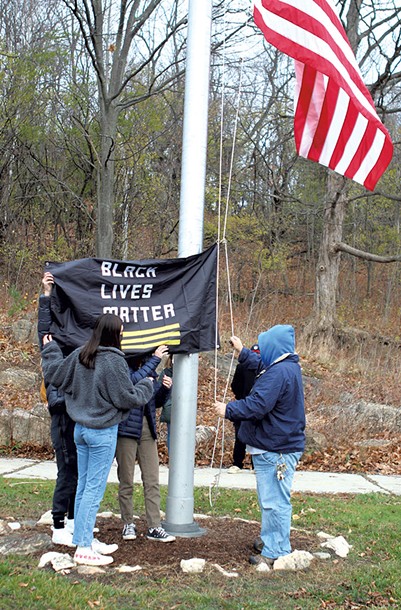

- Courtesy Of Burlington School District
- Burlington High School students raising the Black Lives Matter flag
On a steamy Friday evening last August, a crowd of about 50 gathered at the American Legion in Island Pond to talk about critical race theory. Among the featured speakers were state Sen. Russ Ingalls (R-Essex/Orleans), who has criticized teaching about race, and Ben Morley, a state vocational rehabilitation counselor who is a parent of an Irasburg Village School student.
Morley paced the small, carpeted stage and asked the largely older crowd to stand up. Most people complied.
"I feel that I need to warn you about what's occurring in our school system," Morley said. "Children in class can't do this easy thing — standing up and speaking for what they believe in and defending their own values at home. It's our job to stand up for them." He told the audience how he'd started a Vermont chapter of a group called FAIR after being disappointed by the actions of the Orleans Central Supervisory Union School Board.
FAIR — the Foundation Against Intolerance & Racism — is one of a handful of national organizations that's popped up recently to fight school equity initiatives. On its website, which displays quotes from Martin Luther King Jr. and Frederick Douglass, FAIR bills itself as "a nonpartisan organization dedicated to advancing civil rights and liberties for all Americans." That description only tells part of the story.
The organization was founded less than a year ago by New York parent Bion Bartning, who pulled his children from the upscale Riverdale Country School in the Bronx because he objected to the school's anti-racism curriculum. FAIR has been promoted by staunch conservatives such as Glenn Beck and counts former Fox News host Megyn Kelly and conservative columnist Bari Weiss as advisory board members.
Visitors to FAIR's website can report schools and organizations for teaching about diversity, equity and inclusion in divisive ways. A recent review of Cabot-based Building Fearless Futures, a racial and social justice nonprofit that works with Vermont schools, asserts that its consultants "are hired by school districts in Northern VT ... to indoctrinate and corrupt the minds of our children." Shelburne Farms is also called out — anonymously — on the site for its "anti-racist, equity driven curricula."
At the Island Pond meeting, Morley encouraged the crowd to vote down school budgets, file Freedom of Information Act requests to find out what teachers are teaching, and take legal action against school districts "if we find evidence of indoctrination or discrimination."
A few weeks after the meeting, Morley wrote a letter to his son's teacher — which was promptly posted on True North Reports, a conservative online publication — questioning why his son was encouraged to share his preferred pronouns during an eighth-grade humanities class. In November, Morley filed a lawsuit against his employer, the State of Vermont, asserting that he had been "shamed, humiliated, reprimanded, excluded from assignments and leadership positions, and threatened with termination because he is a white male."
In December, Morley announced that he was running for a seat on the Lake Region Union High School board in Orleans County. The filing deadline for that race is February 21; as of press time, Morley, who declined Seven Days' request for an interview, had one competitor: the incumbent, David Blodgett.
In some states, national money is flowing in to support ideologically driven school board candidates such as Morley. While that doesn't appear to be happening in Vermont, at least a handful of local school board candidates this year has an association with FAIR.
In Springfield, candidate Katie Parent — the woman who stood up at the school board meeting to advocate for color blindness — has expressed her support for FAIR. In a Facebook post outlining her platform, Parent wrote that "it is not acceptable for teachers or school administrators to tell any child that they are a product of racism" and said she'll work "for our tax dollars to be spent on actual academics versus culture, climate and equity." Five people are running for two open seats on that board. Like Parent, fellow candidate Michael Jasinski Sr. also spoke at the August meeting, grilling board members about whether the state had mandated teaching about critical race theory or white supremacy.
In the Mill River Unified Union School District in Rutland County, Shrewsbury candidate Kristine Billings asked the school board in January to consider adopting a FAIR-approved curriculum for teaching about equity. In her letter to the board, Billings asserted that "the essence [of critical race theory] is being spoon feed [sic] repeatedly to the staff during in-service equity meetings and these theories are being matriculated [sic] into the classrooms."
Jeffrey Henig, a professor of education and political science at Columbia University's Teachers College, said the "softer" pro-civil rights, anti-conflict messaging of FAIR is likely to appeal to more traditional Republicans in Vermont, "whereas in some other places, [the messaging] can be a more direct and a little bit less diplomatic language."
Several candidates seem to represent more extreme beliefs. Until recently, Ingrid Lepley, another candidate for Mill River School Board, ran an Etsy shop, AutumnBleuJewelry, selling her QAnon-themed necklaces, among other items. In a Facebook post, Lepley highlighted her extensive experience as a parent volunteer and said she is running to give back to her community. She did not respond to requests for an interview.
In Arlington, former Vermont State Police sergeant Luke Hall is running for a three-year term on the school board. Hall resigned from the police department last year after being suspended for posting comments on Facebook supporting "the great Patriots in Washington D.C." on January 6.
"We are beginning to see good, law-abiding citizens stand against a corrupted Government," he wrote.
Last month, Hall told the Manchester Journal that he is running because of his concern for the welfare of the district's students, saying he thinks that mask wearing has taken a toll on their social and academic growth.
'Little Flames'
click to enlarge 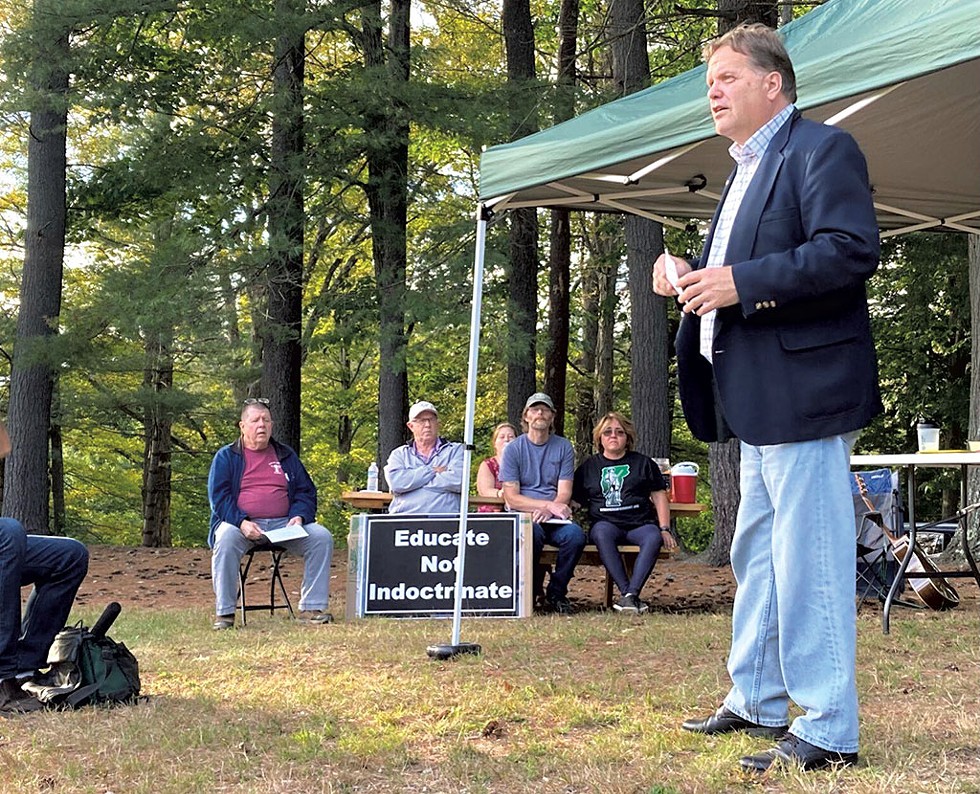

- Courtesy O F Patrick Adrienne/Eagle Times
- Gregory Thayer at an anti-critical race theory rally in September 2021
Challenges from the far right have prompted residents with opposing views to jump into school board races.
Mary Krueger, a parent of a sixth grader in Springfield, said her school board's conversation around critical race theory was one of the main reasons she decided to run for one of two open seats this year. Krueger said she saw Karaffa's anti-critical race theory resolution as part of the national movement to create a wedge in communities and undermine public education.
"Frankly, I felt that [it] really distracted from what we needed to be doing to address the pandemic in our education system," she said. "And that was just really frustrating for me."
In Essex, Emerge Vermont graduate Laura Taylor has been closely following the discussion around equity. Last year, she started a Facebook group, Engaged Community Members of EWSD, to mobilize like-minded residents to speak at school board meetings in support of the equity policy. Now she's running for a school board seat.
"A lot of people who were speaking out against it, I found, didn't really understand it, because there was a lot of misinformation out there," Taylor said.
In Rutland, the battle over the Raiders mascot, and whether it is racially offensive, has resulted in an especially crowded school board election, with 10 candidates running for four open seats. Four candidates who are campaigning together have been promoted by the left-leaning political group Rutland Forward. If they were all to win, the school board would have enough votes to get rid of the Raiders once again.
Another slate of four has been endorsed by Republican lieutenant governor candidate Gregory Thayer, who has spoken at several anti-critical race theory forums. In two separate social media posts, Thayer has described his favored candidates as both "pro-Parent involvement, pro-Human and true, fact-based U.S. history teaching" and "pro-Raider, anti-Woke and Indoctrination."
Pearo, the Rutland resident who said he was spurred to run after the dysfunctional December 14 board meeting, is one of the candidates whom Thayer has endorsed. In an interview, Pearo said that while he likes Thayer, he objects to his "anti-woke, anti-indoctrination" characterization.
"As far as I'm concerned, whatever political beliefs I may hold have absolutely no bearing on what I want to happen at the school board," Pearo said. "My idea of what is right is, 'What do the students believe is right? What do the teachers believe is right?' — not what I believe as an individual."
Dame, the Vermont GOP chair, said he believes that the Republicans who have contacted him about running for school board are sincere in wanting to make schools better for their kids.
"Parents are feeling like going to some of the meetings isn't resulting in the kind of change they want to see, so they're looking at getting involved in the next level," Dame said. "I think some of the folks that I'm hearing from that are conservative want to move through this political polarization of school boards and get back to reading and writing ... There's people saying, 'Let's get back to the core business of what the school is about that's going to unify the community.'"
But even when a candidate's motives are genuine, it's possible for them to be exploited for a grander political purpose.
While people are often energized to get involved in local school board debates because of particular issues that are meaningful to them, Columbia professor Henig said, there are also national political strategists who aren't interested in those particulars.
"They're trying out issues and themes to see which ones they can effectively bring into these broader electoral arenas to try to win swing voters," Henig said. "These things that ... in the past would just be localized, little flames across the country that are unconnected, they're being connected now by other actors who are trying to use those in a bigger political battle."
Choppy Water in Mill River
School board meetings and elections used to be sleepy affairs in the Mill River district, which draws students from Clarendon, Shrewsbury, Tinmouth and Wallingford. But a culture clash that started in June 2020 over the Black Lives Matter flag amped up the intensity of school board business. A year and a half later, the drama is still playing out.
The 2020 election results provide a clue as to why the district is so ripe for polarization. In Clarendon, 53 percent of voters favored president Trump, while 56 percent of Shrewsbury voters and 54 percent of Wallingford voters went for challenger Joe Biden. Tinmouth was split right down the middle — 50-50. Statewide, Trump earned just 30 percent of the vote.
The rift in Mill River began earlier that year, after Reese Eldert-Moore, then a high school junior, brought a proposal to the school board to raise the Black Lives Matter flag at all the district's schools. Eldert-Moore, the daughter of former Rutland Area NAACP president Tabitha Moore, said she was inspired by other school districts in the state that had flown the flag.
"I wanted to raise awareness in southern Vermont," Eldert-Moore said in an interview last month. "A lot of racism in Vermont happens here ... Burlington is a little more open-minded about that stuff."
After the board voted by an 8-4 margin to hoist the Black Lives Matter flag — and the LGBTQ pride flag, as well — the backlash was swift.
Hundreds signed a petition against the flag raising, and, at the next board meeting, dozens of community members weighed in on the decision. While the majority expressed their support for the flag, a small group spoke forcefully against it. Some said they believed that the flag had a political association and, therefore, had no place in schools. Others said it would alienate or exclude students and families who did not believe in the flag's message.
Shrewsbury resident Todd Fillmore, who'd go on to run unsuccessfully for school board in 2021, called the pride flag "open indoctrination of schoolchildren towards sexual anarchy."
Clarendon resident Art Peterson, a former football coach who would win election to the state legislature later that year, said the Black Lives Matter flag was a symbol of a violent organization with Marxist roots; he equated the banner to a Nazi flag.
"We don't have to politicize and sexualize our children's education," Peterson said at the meeting. "I feel that's very strongly what we're doing."
From that point on, "Public comment at board meetings went from virtually nonexistent to 45 minutes, an hour, two hours," said John McKenna, a Clarendon board member at the time who supported flying the Black Lives Matter flag.
Eldert-Moore and her family also faced online harassment that ultimately led them to move out of the county. Because she's biracial, Eldert-Moore said, some commenters asserted that she didn't understand what it was like to be Black.
"My feelings weren't hurt about it, but I was just annoyed and in awe ... that these were full-grown adults saying this about a 17-year-old," she said.
In the wake of the board's decision, some community members sent the board requests to fly other flags — including a Yellow Lives Matter flag, a Your Life Matters flag focused on suicide prevention and a Don't All Lives Matter? flag. Others threatened lawsuits. The board ultimately decided that it acted too hastily and needed guidelines before making any decisions about what flew on the flagpole.
After crafting a policy last fall that outlined criteria for approving flag requests, board members received a letter from the Liberty Counsel — an organization affiliated with Virginia-based evangelical Liberty University that's been designated an anti-LGBTQ hate group by the Southern Poverty Law Center — urging them to abandon it and hinting at further legal action.
"There is no need for the district to overtly or covertly introduce and endorse divisive political organizations and political causes that disrupt the orderly administration of the schools," Liberty Counsel attorney Richard L. Mast wrote in his November 2020 letter.
The school district's attorney responded later that month asserting that the policy was sound and questioning why an organization outside the state was inserting itself into the matter.
"Your letter does not indicate that you represent any person affected by the policy, nor does it appear that you are licensed to practice law in Vermont," Mill River's lawyer, Sean Toohey, responded. "Nonetheless, the district has considered your concerns and concludes that the policy is sound."
The board encouraged Eldert-Moore to resubmit her proposal to fly the Black Lives Matter flag. She did last June — limiting it to the high school — and it was approved by an 8-3 margin.
McKenna, who had served on the school board for eight years, wasn't there to cast his "yes" vote, though. He'd lost his reelection bid three months earlier, an outcome he attributes to his ardent support of equity issues in the conservative community he grew up in.
"I just had a feeling that that could be the end of my [school board] career," McKenna said of his decision to make the motion to fly the Black Lives Matter flag back in 2020. "But I decided that it was an important enough thing to want to just go ahead and do it."
Mill River Union High School raised the Black Lives Matter Flag on September 7. Later that night, it was stolen, which "was nothing surprising to me or anyone I knew," Eldert-Moore said.
After that, school administrators made the decision to take down the flag each evening. It flew for three months — the time specified in the district flag policy — without further incident.
Still, those who initially opposed the flag raising continue to show up to school board meetings to state their grievances. In November, now-Rep. Peterson (R-Clarendon) said he was concerned that the district was teaching critical race theory, although administrators have said it is not.
In a phone interview in late January, Peterson said even if critical race theory isn't "sanctioned to be taught," he still believes that its concepts are seeping into Mill River's schools.
"What happens, in my opinion, is that if an individual teacher uses the words around critical race theory and espouses that in the classroom, then it's being taught," Peterson said. "White superiority, white privilege — I just don't think those words belong in the classroom, I really don't."
Mill River board member Maria French, who also supported the Black Lives Matter flag raising, said she believes that change is difficult for some in her community. French, of Wallingford, recently announced that she won't be serving the remainder of her three-year term. She said she no longer has the time and energy to devote to the school board since she began teaching full time in a neighboring district.
"People can feel threatened by things they don't understand, and that makes it harder to listen to each other," French said. "It's like we've divided up into camps."
French said there are both pros and cons to the increased public participation at local school board meetings.
"In some ways, it's great that people show up and pay attention to what the board is doing," French said. "But if they're so focused on one thing, then it seems like they miss the point of the responsibility of the board. It doesn't mean that they understand what we're doing or that they respect that we're community members. It's just this pounding we feel after a while."
Searching for Common Ground
In an environment that has become so politically polarized, is it possible for school communities to find common ground, or at least understanding?
That seems to be what happened in South Burlington more than four years ago.
At issue was the school's mascot, the Rebels, which for some evoked the Confederacy. After the school board unanimously voted to drop the name, a community backlash ensued. Residents voted down the school budget twice. A pro-Rebels parent was arrested for stalking the multiracial high school student who proposed the mascot change. Anonymous email threats of violence put the high school into lockdown. Racist graffiti was spray-painted on the football field.
But in 2018, the Vermont Supreme Court rejected an attempt by pro-Rebels residents to force a city referendum on the mascot change. And the community appears to have adjusted. The new Wolves mascot has become one of the most unifying aspects of the school, South Burlington High School principal Patrick Burke said last fall: "We've never had more school spirit."
Madison Akin is looking for common ground in her community, too. An elementary school counselor who has lived in Clarendon for 23 years, Akin has made a habit of trying to start conversations with those with different viewpoints around issues such as critical race theory and equity.
When Akin focuses conversations on students' well-being, she finds that it's easier to have a more respectful dialogue. Still, she said, it's challenging when people come to the table with misconceptions about what's going on in classrooms.
"The people who are so angry — like, 'You're brainwashing our kids to believe these things' — it's so difficult to defend against the thing that's not happening," Akin said. "The angry voices are always the loudest in the room. The ones of equity and inclusion and fairness are usually not the yelling voices."
Though Akin worries about the direction in which school boards are going, she also thinks that there are reasons to be optimistic.
"I find so much hope in our future leaders and the ways that kids have conversations about things that adults struggle with, like pronoun use," Akin said. "When we're talking about changing hearts and minds and bringing people along to show how we can be a better community, we're small enough that that doesn't feel like a ridiculously daunting task."
That viewpoint was bolstered last June, when the Mill River school board voted, for the second time, to raise the Black Lives Matter flag. New board member Matt Gouchberg, who had previously said he was against the flag, ended up voting for it.
"Honestly, when I came into this meeting, I did not intend to vote yes to this flag," Gouchberg said after the vote. "And I see this as a learning experience, where differences can come together."
In St. Albans, Reier Erickson, a Black resident who spoke passionately about removing school resource officers from the district last year when he ran for the Maple Run school board, said he's feeling more hopeful than he has in the past.
Even after losing that election, he and others continued to show up at meetings to explain why they felt that armed, uniformed police officers in schools harmed marginalized students. This fall, the Maple Run board voted 8-1 to remove officers from district schools and create a police liaison program instead; Peter DesLauriers, who defeated Erickson last year, was the "no" vote.
"It was unbelievable," Erickson said. "It was a big victory after 14 months of attending school board meetings and writing and doing all this stuff. I just would not have expected it to be that decisive of a vote."
Erickson will try again to win a seat on his school board this year. He's got a competitor, though — Green Mountain Hemp Company chief operating officer Keith Longmore, who has claimed on social media that Black Lives Matter supporters were responsible for the January 6, 2021, insurrection at the U.S. Capitol and slammed Vermont teachers for being selfish. Longmore, who is also Black, declined an invitation to appear with Erickson in a public candidate forum that aired on Northwest Access TV last week. Longmore did not respond to an interview request.
Erickson said he's disappointed that his opponent didn't participate.
"I am always willing to sit down with anyone, regardless of their views, and have a robust conversation," Erickson told Seven Days. "I think that's core to public service and elected positions."
Former Randolph principal Hawkes also believes that engaging with people who see things differently — even if you don't condone their behavior or views — is important. Both Republicans and Democrats can fall prey to tuning out those who don't agree with them, he said.
"I think there's blame to go around," Hawkes said. "On the left and on the right, we're guilty of this cancel-culture impulse that erodes trust and defeats dialogue."
But, he added, "I can think of no group of people better positioned than educators to be committed to dialogue no matter what people believe. Our doors are open to whoever walks in the door. We're a public school. Come on in. Let's talk."
Correction, June 20, 2022: An earlier version of this story misidentified Ben Morley's competitor for Lake Region Union High School board. The story has been updated.
Got something to say?
Send a letter to the editor
and we'll publish your feedback in print!
About The Author

Alison Novak
Bio:
Alison is the former managing editor at Kids VT, Seven Days' parenting publication and writes about education for Seven Days.
Alison is the former managing editor at Kids VT, Seven Days' parenting publication and writes about education for Seven Days.
More By This Author
Latest in Education
Speaking of...
-

Legal Worries Prompt a Randolph School to Take Down a Black Lives Matter Flag
Jun 1, 2022 -

Video: Juniper Creative Arts Paint Community Murals with Students in the NEK
May 19, 2022 -

Controversial Essex Westford School Board Member Resigns
May 4, 2022 -

Board Candidates in Essex Westford School District Differ on Equity Issues
Apr 8, 2022 -

Voters Reject School Board Candidates With Divisive Platforms
Mar 2, 2022 - More »




























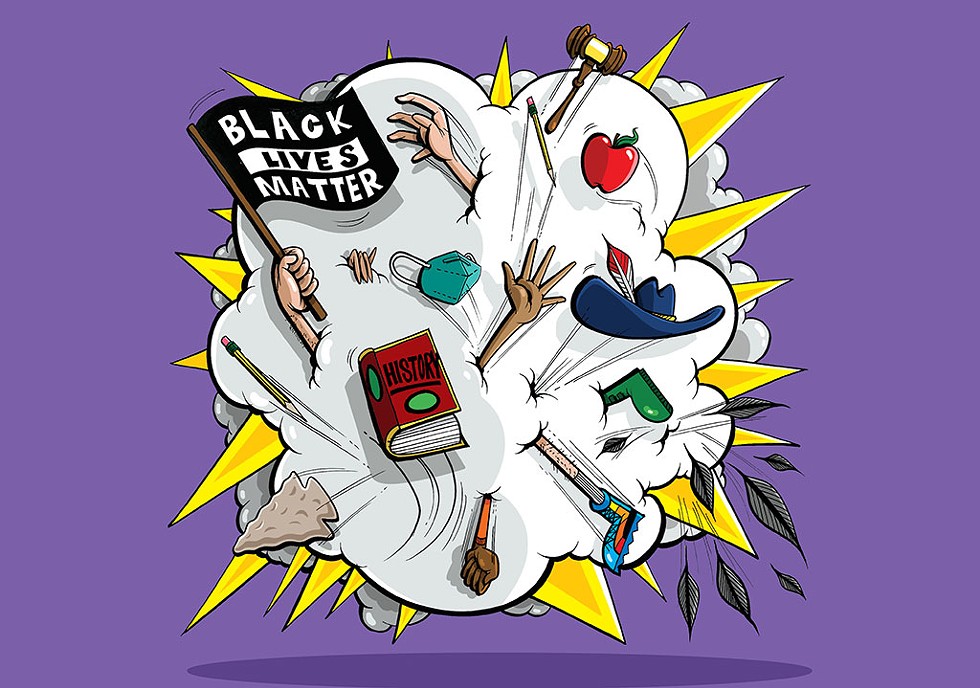


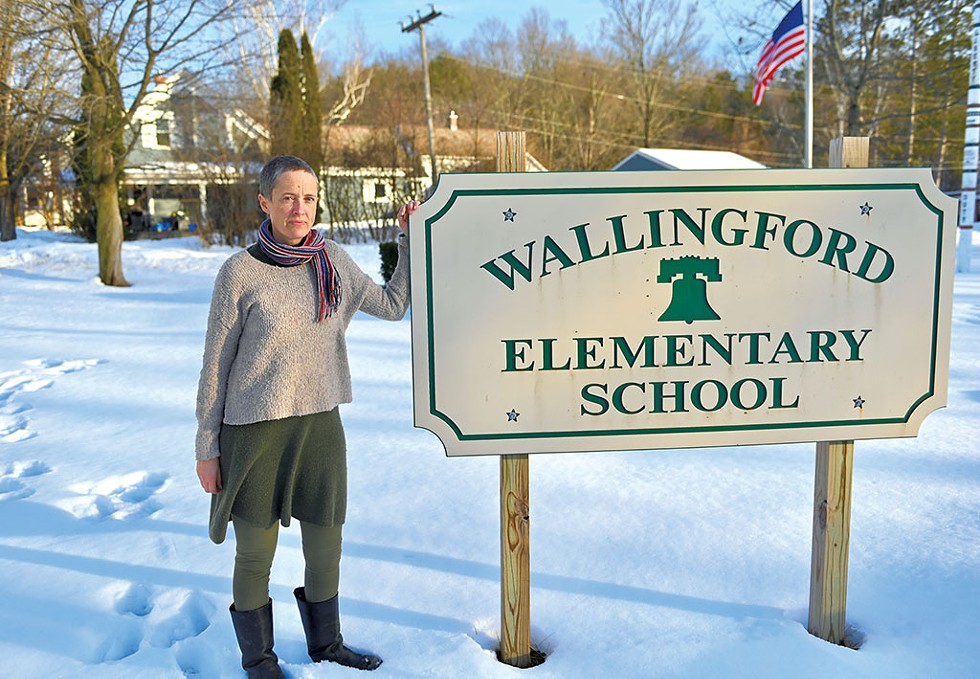
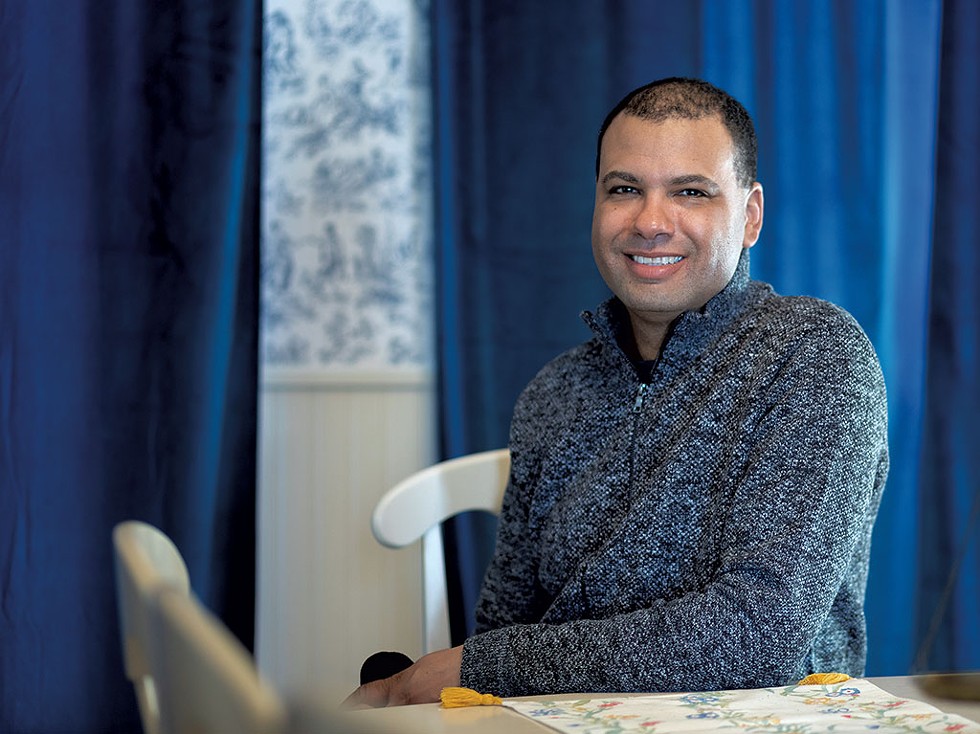






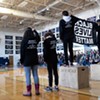
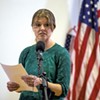



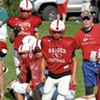











find, follow, fan us: